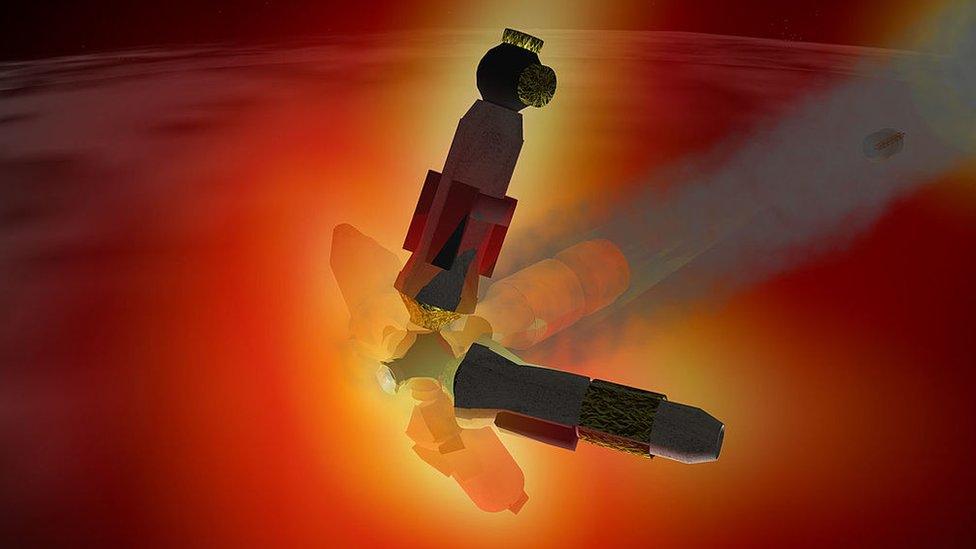Chinese rocket debris expected to crash on to Earth this weekend
- Published
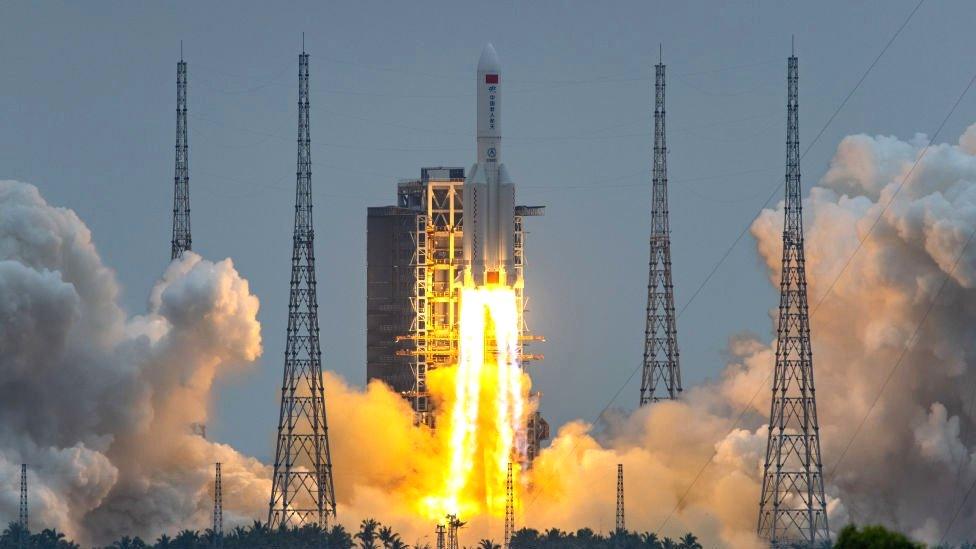
The Tianhe module was launched from the Wenchang Space Launch Centre
Debris from a Chinese rocket is expected to fall back to Earth in an uncontrolled re-entry this weekend.
It is not clear where and when exactly the rocket parts will crash on the surface.
The Long March 5B rocket was launched in late April to carry the first module of China's future space station into orbit.
The body of the rocket is currently circling Earth, about to enter the lower atmosphere.
The US on Thursday said it was watching the path of the object but currently had no plans to shoot it down.
"We're hopeful that it will land in a place where it won't harm anyone," US Defence Secretary Lloyd Austin said. "Hopefully in the ocean, or someplace like that."
He also indirectly criticised China, saying there was a need to "make sure that we take those kinds of things into consideration as we plan and conduct operations".
Chinese state media has over the past days played down fears the rocket might crash on inhabited land, suggesting it will fall somewhere in international waters.
The Global Times quoted aerospace expert Song Zhongping who added that China's space monitoring network would keep a close watch and take necessary measures should damage occur.
What will happen to the rocket?
The rocket is currently in a low orbit, which means it circles around the Earth but is still gradually pulled down.
"Drag will slow the object causing loss of altitude, bringing it down into denser atmosphere, which in turn causes more drag and further loss of velocity and altitude," Jason Herrin of the Earth Observatory Singapore, told the BBC.
"Once this process starts, the object will be locked into an irreversible downward journey," he explains.
The rocket is expected to largely burn up as the atmosphere gets more and more dense at about 60km altitude from the surface. The parts that don't burn up completely will remain and fall to Earth.
If all this happens uncontrolled, the place where the rocket burns up and where the debris will fall can be neither controlled nor accurately predicted.
A previous launch of another Long March 5B in 2020 also saw the body re-enter in an uncontrolled way, with some debris crashing in a rural part of Ivory Coast.
China's space agency has not made any comment on whether the rocket is being controlled, or if it will make an uncontrolled descent, say reports.
'Hoping they get lucky'
Astronomer Jonathan McDowell, of the Harvard-Smithsonian Center for Astrophysics, said the issue of a uncontrolled re-entry is one that is "only a big problem with the Long March 5B".
"Small US and European upper stages also re-enter uncontrolled (and burn up entirely) but the big US or European rockets are specially designed not to leave big stages in orbit; they are always safely disposed of on the first orbit of the flight," he told the BBC.
"China decided they would rather use a simpler design and hope that they get lucky with the stage re-entering uncontrolled but not hurting anyone."
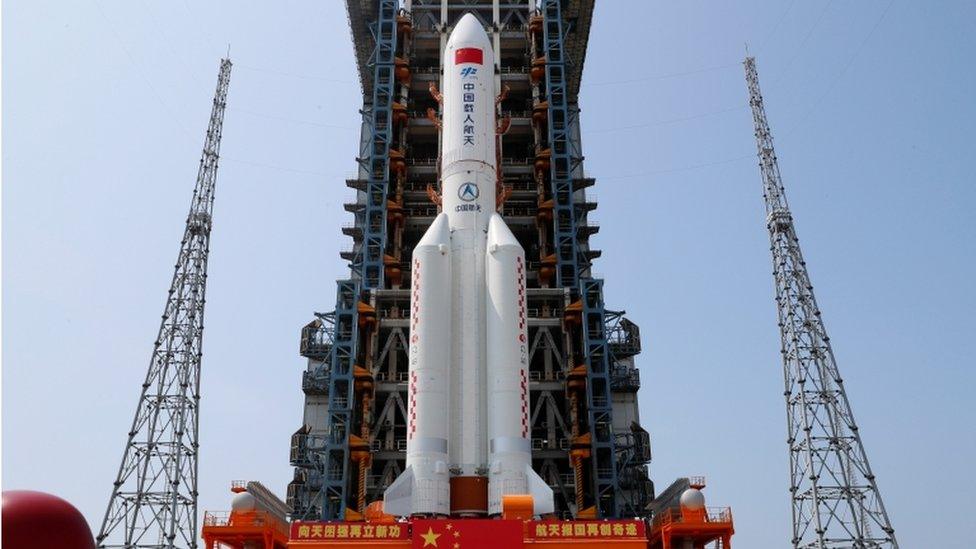
China's Long March rocket is at the heart of its space programme
A controlled re-entry would have meant that the rocket can still be controlled by the launch team, for instance via the rocket engine or small thrusters. The debris would usually be steered towards a specific crash site in the middle of the ocean and away from people.
That way, the flight path can be influenced and re-entry can be immediate and at a predictable location.
Usually, this would be in what is called the oceanic pole of inaccessibility - the furthest place from land in the South Pacific, between Australia, New Zealand and South America.
Over an area of approximately 1,500 sq km (580 sq miles) this region is a graveyard of spacecraft and satellites, where the remains of around 260 are thought to be scattered on the ocean floor.
China's space ambitions
The current Long March rocket took off on 29 April 2021 from China's Wenchang Space Launch Centre.
It was carrying the key module for a new permanent space station as part of China's increasingly ambitious space programme.
Beijing plans to have at least 10 more similar launches, carrying all the additional equipment into orbit, before the completion of the station by 2022.
China also also plans to build a lunar station in cooperation with Russia.
The country has been a late starter when it comes to space exploration, sending its first astronaut into space only in 2003, decades after the Soviet Union and the US did so.
Reporting by the BBC's Andreas Illmer

You might also be interested in:
SpaceX: Resilience takes four astronauts to ISS
Related topics
- Published29 April 2021
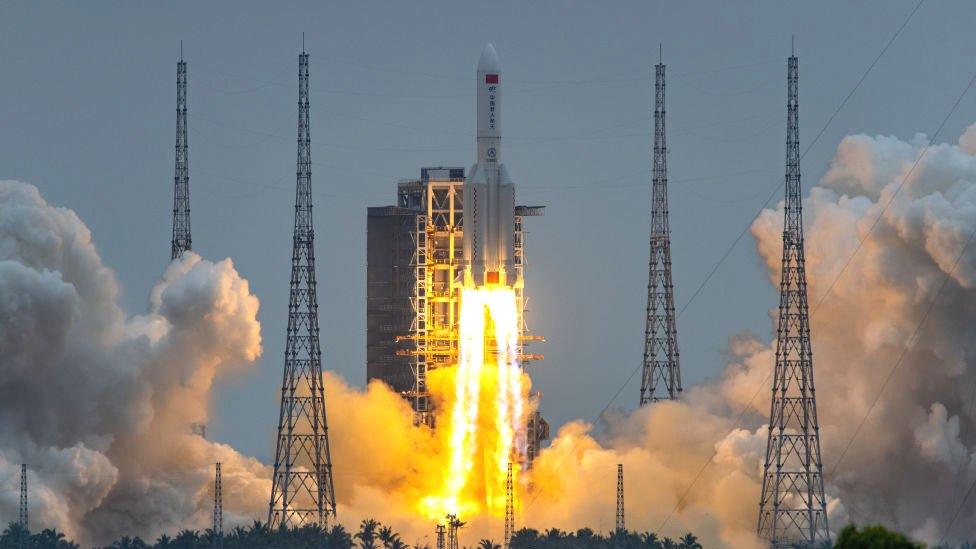
- Published4 December 2020
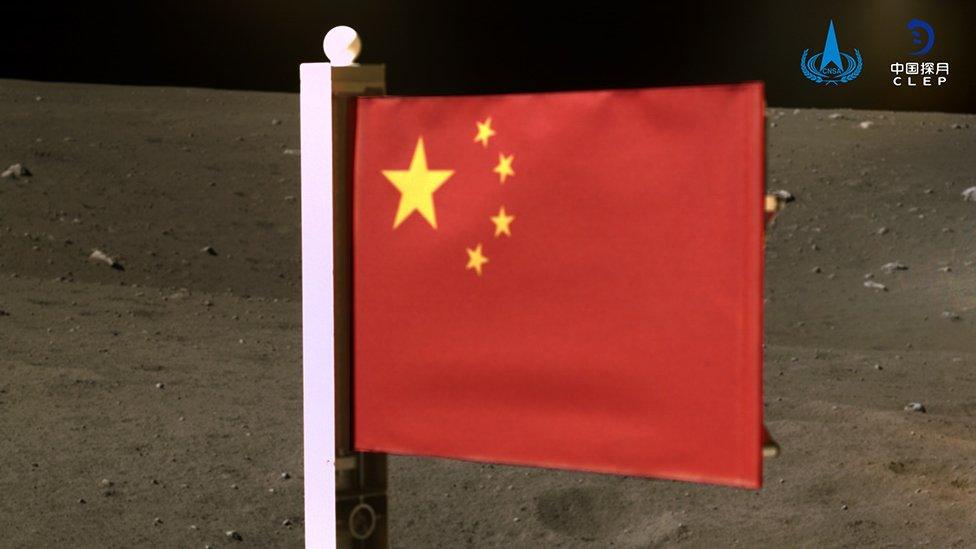
- Published15 March 2018
- Published21 October 2017
